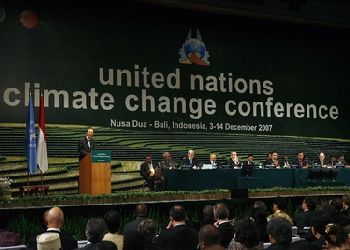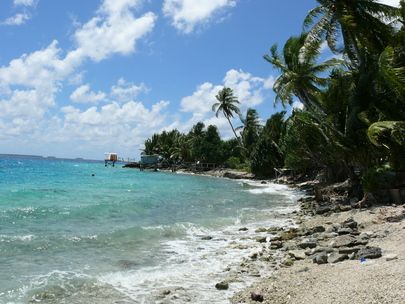
Publisher:
Bonnie King
CONTACT:
Newsroom@Salem-news.com
Advertising:
Adsales@Salem-news.com

~Truth~
~Justice~
~Peace~
TJP
Dec-17-2009 02:37

 TweetFollow @OregonNews
TweetFollow @OregonNews
UN's Ban Ki-moon Lays Out Remaining Hurdles in Copenhagen Climate Talks
Salem-News.comSlideshow features photos of Climate Change and the UN Secretary General's involvement.
 UN Photos by Mark Garten |
(COPENHAGEN, Denmark) - The outcome of the historic climate change negotiations in Copenhagen hinges on the issues of emissions reductions and financing, Secretary-General Ban Ki-moon said today as he urged world leaders to use the final days of the talks to strike an ambitious new agreement.
The Nobel Peace Prize-winning Intergovernmental Panel on Climate Change has found that to stave off the worst effects of climate change, industrialized countries must slash greenhouse gas emissions by 25 to 40 per cent from 1990 levels by 2020, and that global emissions must be halved by 2050.
“I hope that the developed countries should come out with more ambitious mid-term target by 2020 against the 1990 level,” Mr. Ban told reporters in Copenhagen today.
The other main issue, he said, is “the most important key to bridge the gap between the developed countries and the developing,” and he called for “sufficient financial and technological support for the developing countries, particularly the most vulnerable states.”
The Secretary-General said there has been progress on this front, with $10 billion having been committed every year until 2012 by both the European Union and Japan. With two-thirds of the money needed already having been pledged, he expressed confidence that the remainder is forthcoming.
He also underscored the importance of a “firm commitment by the developed countries that this long-term financial support will be given and should be given and there should be an initial formulation of mechanism or mechanisms for this provision of financial support.”
UN Photos by Mark Garten tell a story of Climate Change and the UN's involvement |
Yvo de Boer, Executive Secretary of the UN Framework Convention on Climate Change (UNFCCC), also pointed to some outstanding issues in the final days of the Copenhagen summit, which is set to wrap up on Friday.
“I still believe that it’s possible to reach a real success [in Copenhagen], but I must say in that context that the next 24 hours are absolutely crucial and need to be used productively,” he said at a press conference.
The high-level segment of the Copenhagen summit continued in the Danish capital today, and some 120 heads of State and government are expected to attend the final sessions.
To pave the way towards ‘sealing the deal’ on a new climate agreement, Mr. Ban met today with leaders and representatives of groups of nations, including the Group of 77 (G77), the African Group, the Least Developed Countries and the Association of Small Island States.
Among the leaders he met on the sidelines of the conference were United Kingdom Prime Minister Gordon Brown and Lebanese Prime Minister Saad Hariri.
Arriving yesterday in Copenhagen, the Secretary-General exhorted nations to ‘seal the deal’ on an ambitious new agreement, warning that the well-being of all of the world’s people is at stake.
The summit under way is “as momentous as the negotiations that created our great United Nations… from the ashes of war more than 60 years ago,” Mr. Ban said at the opening of the high-level meeting. “Once again, we are on the cusp of history.”
 View of Collins Glacier in Antarctica |
Any deal, the Secretary-General emphasized, must incorporate five key elements: more ambitious mid-term emissions reductions targets from industrialized countries; stepped-up efforts by developing nations to curb emissions growth; an adaptation framework; financing and technology support; and transparent and equitable governance.
He also underlined the need for countries to hammer out how to provide medium- and long-term financing to bolster climate resilience, limit deforestation and further low-emissions growth.
In a related development, a UN independent expert today underlined that any agreement reached in Copenhagen must emphasize human rights to avert hunger among the world’s most vulnerable.
“Climate change is a ticking time bomb for global food security,” said Olivier De Schutter, the Special Rapporteur on the right to food.
Global warming, he said, disproportionately impacts some of the poorest countries, especially the most vulnerable in these nations, with small-scale farmers and indigenous peoples dependent on land for their livelihoods.
The expert called on States to “exploit the untapped potential of sustainable agriculture in order to combat hunger and climate change at the same time.”
He also reiterated last week’s call from a group of UN human rights experts, including himself, that “a weak outcome of the climate change negotiations threatens to infringe upon human rights.”
Policies, Mr. De Schutter said today, must be based on a human rights framework and take the right to adequate food into account so that the needs of the most vulnerable will be prioritized and that poverty and inequality will not be exacerbated.
“This is not a theoretical debate,” he stressed, adding that there have been real cases of the violation of the right to food linked to climate policies.
 Nukunonu Atoll, a world region vulnerable to impacts of climate change. |
A new report issued today found that the cost of not reaching a global agreement to mitigate the effects of climate change in Copenhagen will be equivalent to 137 per cent of the current gross domestic product in Latin America and the Caribbean by 2100.
Without international mitigation actions, the region stands to suffer losses in agriculture, biodiversity and infrastructure, while facing the growing intensity of natural disasters, according to the study, backed by the Economic Commission for Latin America and the Caribbean (ECLAC).
Also in the region, the UN Development Programme (UNDP) and Ecuador have joined forces for a new initiative to protect the Latin American nation’s rich biodiversity and its indigenous population’s culture by leaving 850 million barrels of oil in the ground.
The oil is in the protected Yasuni National Park, one of the world’s largest reserves, which has been designated by the UN Educational, Scientific and Cultural Organization (UNESCO) as a biosphere reserve. It is also home to indigenous people living in voluntary isolation.
By leaving the oil untouched, Ecuador will prevent more than 400 million tons of carbon dioxide from being released, and to off-set the lost revenue, Ecuador will create a multi-donor trust fund to be administered by UNDP in the agreement reached earlier this week in Copenhagen.
Source: United Nations
Articles for December 16, 2009 | Articles for December 17, 2009 | Articles for December 18, 2009
Quick Links
DINING
Willamette UniversityGoudy Commons Cafe
Dine on the Queen
Willamette Queen Sternwheeler
MUST SEE SALEM
Oregon Capitol ToursCapitol History Gateway
Willamette River Ride
Willamette Queen Sternwheeler
Historic Home Tours:
Deepwood Museum
The Bush House
Gaiety Hollow Garden
AUCTIONS - APPRAISALS
Auction Masters & AppraisalsCONSTRUCTION SERVICES
Roofing and ContractingSheridan, Ore.
ONLINE SHOPPING
Special Occasion DressesAdvertise with Salem-News
Contact:AdSales@Salem-News.com

googlec507860f6901db00.html



Terms of Service | Privacy Policy
All comments and messages are approved by people and self promotional links or unacceptable comments are denied.
[Return to Top]
©2025 Salem-News.com. All opinions expressed in this article are those of the author and do not necessarily reflect those of Salem-News.com.